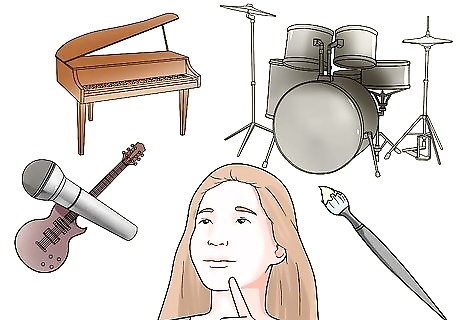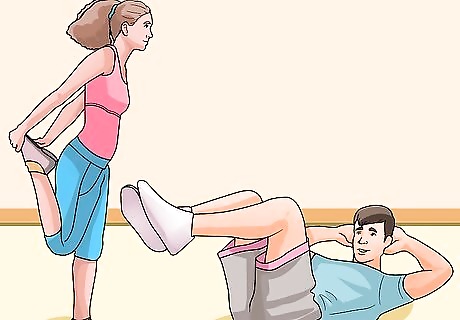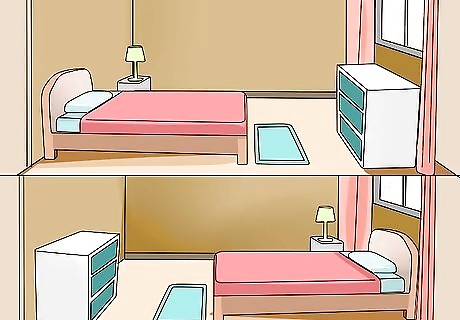
views
Discovering Yourself

Discover your talents. If you're feeling inadequate or immature, it probably stems from not finding and pursuing your true talents. Part of becoming an adult, in this sense, is reaching a degree of independence. Start by trying several jobs or activities to find what you're naturally skilled at. For example, you might volunteer at a hospital and discover that you're great at working with people or handling difficult situations. This might lead you to pursue a career that's people-oriented. Studies suggests that the people who are happiest with their lives find their natural talents and pursue them. This is more important than choosing a career based on popularity or income.

Recognize that your life is unique. Since no two people ever follow the exact same life path, your own development as a person will be unique. This can be difficult to appreciate since people live in communities and societies that often have expectations and age-related milestones. For example, your society might expect you to get an education, find a job, and start a family, in that order. Or, you might be expected to care for a family member instead of starting off on your own. It can be hard to know what to do when social expectations conflict with what you'd like to do with your life. Remember that research suggests that those who are happiest with their lives aren’t necessarily those who chose their career path based upon its prestige.

Figure out what you're passionate about. Find which activities, people, or things make you act with the most enthusiasm and passion. This will help you feel more independent and competent in your daily life. Avoid simply acting on an impulse. Instead, give some thought to what you're already motivated by and learn to use these abilities. For example, you may realize that you're passionate about teaching others. Use this knowledge to look for opportunities to use that enthusiasm. You may tutor classmates, teach in a school, or go to school to become an educator. If you're not sure how to figure out what you're passionate about, try thinking about the things you enjoyed when you were younger. You could also think about things that you dreamed about but thought would never be possible.

Think about what makes you happy. Start by making a list of as many happy situations you can remember. Write down as many details regarding the events as you can remember. A list will help you figure out what it was about these situations that made you happy or energetic. You may notice that you were with the same few people. Or, maybe you found that you enjoy figuring out challenges. Since different things make different people happy, it's important that you know what you enjoy. For example, your list might have something like playing video games, playing the drums, or painting. This might lead you to realize that you're happiest when you're working with your hands.

Become independent. This is especially true if you're a young adult, relying on your parents to support you. Take steps to take care of yourself and your needs. This might mean getting a job to support yourself financially. Or, if you notice you're lonely, schedule time with friends to get some company. Avoid relying on others to take care of you and look after your needs. Part of growing up is recognizing that you are the one that's responsible for you. Once you're supporting yourself, it will become easier to make your own decisions and stand by them.

Make your own decisions. While you're growing up, others often make all your decisions for you, be they major or minor ones. Part of becoming your own person is moving to make your own choices. You might start with smaller choices, like which classes to sign up for in school or where you want to eat. Gradually, start making larger life decisions for yourself. For example, if you're unhappy in your job, you can decide to quit or change careers. Or, if you're tired of living with your parents or a roommate, you can decide to move out on your own.
Changing Your Life

Look for opportunities to foster your talents and interests. Once you know what makes you passionate and happy, look for jobs or volunteer opportunities. For example, if you realize you’ve always enjoyed talking to your grandparents, you might try to find work with an organization that assists the elderly in some capacity. Or, if you're interested in video games, you could look into becoming a computer programmer or video game designer. Look for opportunities that will make you happy in the long term. Ask yourself where you see yourself in five or ten years. Then, consider whether job or volunteer offers fit into that picture.

Use your passion to connect with others. Discovering yourself is an important part of growing up and creating your own life, but you need to include others too. Research has shown that when you network with others about your passions, your passions are supported or enhanced. Regardless of what your passions are, you can find a local or digital community that share similar interests. You may even find that networking creates job opportunities that allow you to focus entirely on your interests. Think about how you want to give back to the world. You'll likely be surprised by how much people need whatever it is you have to offer. For example, if you're motivated to woodwork, you might look for a local group that meets to share a workshop. They may be able to offer you advice on honing your skill and could even tell you about opportunities to sell your work.

Take care of yourself. Part of growing up is developing strategies for self-care. This means being able to respect yourself and handle your emotional and physical needs. This way, you won't be overly dependent on others. For example, you should be eating a healthy diet, maintaining good physical health, getting enough rest, and creating respectful relationships. You'll also need to learn how to manage your desires and be happy without interfering with people who want to be left alone. For example, if you feel compelled to repair a relationship with a family member, but are refused, you'll need to learn how to move on without fulfilling that need.

Experiment with routines and small changes. Create a daily routine, even if it's just a few simple acts, like showering when you wake up or making your own breakfast. Sometimes life can feel overwhelming when you try to change everything all at once. Start with those elements of your life over which you clearly have the most control. For example, you might try rearranging the furniture in your home, changing your hairstyle or attire, or maybe even getting in the habit of going on a walk around your neighborhood everyday. If you want even more structure, sit down and write out everything you plan to do the next day and the time you’d like it done by. This will give you some sense of control over the changes in your life. Take a look at the day-to-day habits of successful people you look up to. That can help you get inspired to make small changes in your routine that can help you be more productive.

Get an education. The right kind of education can improve your life in many areas. You might make more money, learn more about yourself, expand your social network, and be more understanding of others. There are plenty of educational levels and opportunities available to you. Choose a program based on your interests, your finances, and your commitment to an educational program. For example, you could attend a vocational program to learn a trade, get a 2-year associate's degree, get a 4-year bachelor's degree in a field of your choice, or even go on to graduate school.

Start a nurturing relationship. Whether you're looking for a romantic relationship or a friendly one based on mutual respect, relationships can enrich your life. Build a solid relationship through open communication, honesty, and dedication. Making a meaningful relationship won't happen overnight. Invest in the relationship by working through disagreements or rough situations, which shows you're in a mature relationship. Make sure you're available to the other person. If you're only there for the other person when it's convenient for you, the relationship isn't making you a stronger person, nor is it healthy for the other person.

Look for job or volunteer opportunities. Chances are, you'll need to support yourself somehow. Find a job that challenges you, fulfills you, and that you enjoy. Realize that you may need to try several jobs before you find one that you really connect with. If you're not looking for a job, you'll still need something meaningful to fill your time. Look for volunteering opportunities within your community. Volunteering is a great way to learn about yourself, people in your community who need help, and pick up new skills. It can make you feel more fulfilled and improve your social skills.


















Comments
0 comment